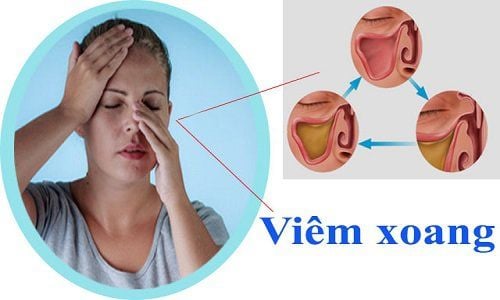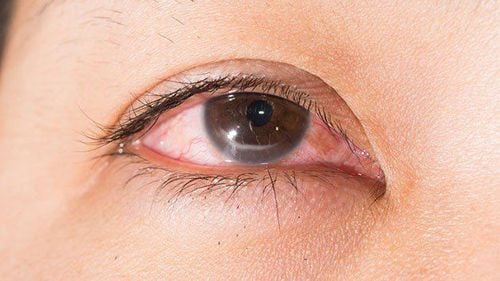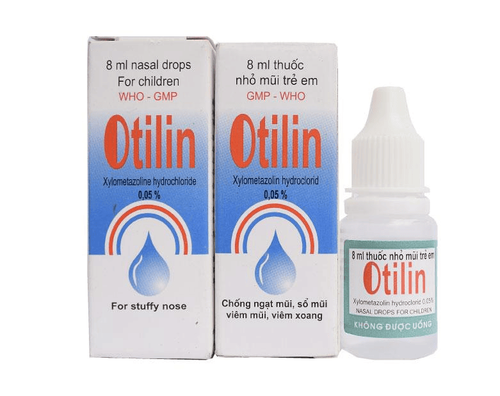This is an automatically translated article.
The article was professionally consulted with Doctor CKII Nguyen Van Thai - Department of Medical Examination & Internal Medicine - Vinmec International General Hospital Da Nang.1. Complications of sinusitis
Sinusitis is a common disease in our country, accounting for more than 30% of the population and is increasing, especially in big cities. Although the disease is not life-threatening, if it is prolonged and not properly treated, it can cause many serious complications of sinusitis, especially in the eye area.According to statistics, up to 85% of people with sinusitis have complications of eye infection, including about 10% of blind eyes, 60% of cases of posterior ethmoid sinusitis, and sphenoid sinusitis have symptoms of cord inflammation. optic nerve.
Besides, there may be inflammation of the connective tissue around the eyes, eyelid abscess, tear bags.
2. Risk of orbital infection due to sinusitis
Risk of complications of orbital infection caused by rhinosinusitis:The orbit is an area surrounded by a system of facial sinuses. The base of the frontal sinus is the ceiling of the orbit. The superior wall of the maxillary sinus constitutes the lower border of the orbit. The nose is separated from the eye socket by a very thin bone wall. The location of the block on the side of the sinus is right next to the eye area. Because the structure of the two areas of the sinuses and the eye sockets are closely related, infections from the nose and sinuses can harm the eyes such as orbital swelling, eyelid inflammation,...
Rate of patients with complications Sinusitis in the eyes is high due to neglect in the examination and treatment of the disease. Many patients self-diagnose the disease, do not go to the doctor and think that sinusitis is a long-term disease, then it will return, so it is also subjective in treatment.
In some cases, patients voluntarily bought oral drugs or after going to the doctor and were prescribed drugs, but did not comply with the treatment process, they stopped taking the drugs on their own, leading to the phenomenon of drug resistance. There are cases because you want to shorten the treatment period, but arbitrarily increase the dose ... leading to serious complications of sinusitis.

3. Symptoms of orbital infection caused by sinusitis
Orbital infection is a serious infection that can push the eye out of the eye socket. Common symptoms of the disease include pain, swelling, and protrusion of the eye.Other symptoms of an eye infection may include:
Eye movement restrictions or pain when you try to move your eyes Vision loss or sudden loss of vision Red swollen eyelids Difficult or impossible Open eyes Fluid from infected eyes Fever, fatigue, headache Loss of appetite
4. Diagnosis of orbital infection due to sinusitis
If you have symptoms of an eye infection, you should see an ophthalmologist immediately. Early diagnosis of orbital infection is important to prevent serious complications.The doctor will begin the diagnosis of an orbital infection by observing the eye. The ophthalmologist will check for physical signs of an orbital infection, such as redness, swelling, pain, and fever. They may then order other tests to help determine the extent of the infection and the appropriate course of treatment. The doctor may take a sample of blood or discharge from the patient's eye for analysis to determine which germ is causing the infection. Your eye doctor may also recommend imaging tests, such as an MRI or CT scan, to assess the extent of the infection and check for complications involving the brain or central nervous system.
5. Treatment of orbital infections caused by sinusitis
The treatment of orbital infections depends on the symptoms and severity of the disease, acute or chronic stage, complications or not.5.1 Antibiotic treatment At a mild level, the doctor may prescribe the patient to use antibiotics, anti-inflammatory drugs, usually intravenously. However, patients need to strictly adhere to the prescription of the drug and do not arbitrarily adjust or stop the drug without consulting a specialist.

People with orbital infections often need to be hospitalized during antibiotic treatment. To avoid an eye infection that can spread quickly, healthcare professionals will need to closely monitor the patient for signs of worsening of the infection or whether the patient is responding to antibiotics.
5.2 Surgical treatment The cases in the risk group below need to quickly perform functional surgery of the nose and sinuses as soon as possible to avoid dangerous sinusitis complications not only in the eye socket but also have other complications such as: meningitis, brain abscess, cavernous sinus thrombophlebitis, osteomyelitis...
Chronic rhinosinusitis with intensive medical treatment for more than 3 months, patients with nasal deformities Rhinitis Rhinitis Sinusitis causes complications Rhinitis sinusitis seriously affects respiratory function, ability to smell... People with nasal polyps Surgery to treat orbital infections includes:
Draining fluid from an infected area infection or abscess Removal of foreign objects Take culture samples for further analysis Endoscopic sinus surgery is considered the superior solution in surgical treatment of sinus diseases.
However, in order to have a safe surgical effect, thoroughly remove the sinusitis, not cause damage to surrounding tissue, recover quickly and limit the risk of recurrence, the risk of postoperative complications, people Patients should pay attention to choosing a reputable surgical address with a team of qualified and experienced doctors, a system of modern equipment, and absolutely sterile operating room.
Treatment of diseases of the nose and sinuses is not easy, especially the treatment of orbital infections due to complications of sinusitis, patients need to be patient, not subjective, as soon as there are symptoms of the disease, they need to go to the hospital quickly. to be examined, diagnosed and prescribed the right treatment by a specialist.
Please dial HOTLINE for more information or register for an appointment HERE. Download MyVinmec app to make appointments faster and to manage your bookings easily.














